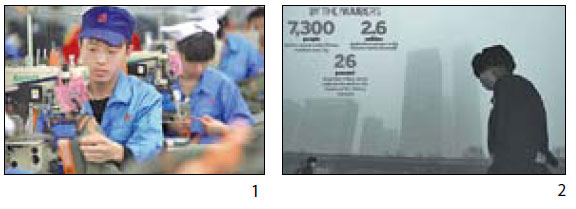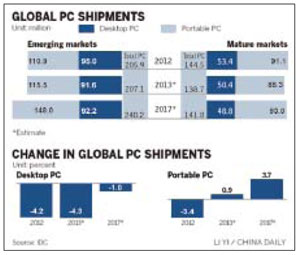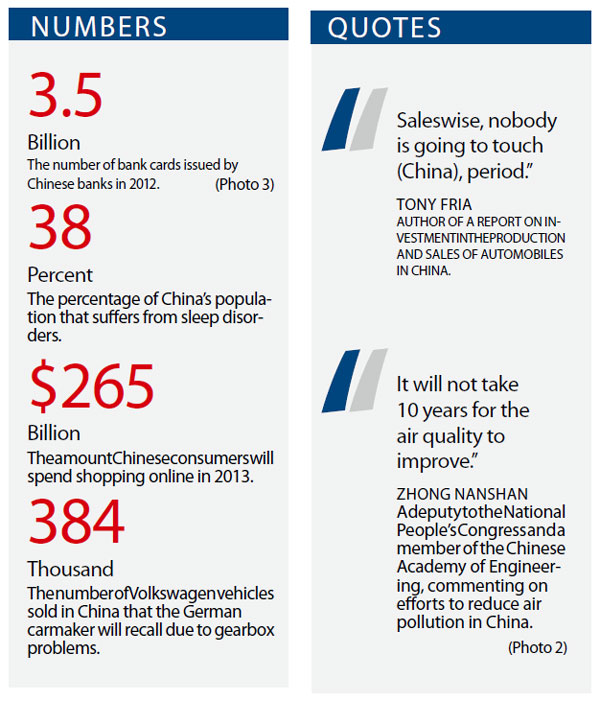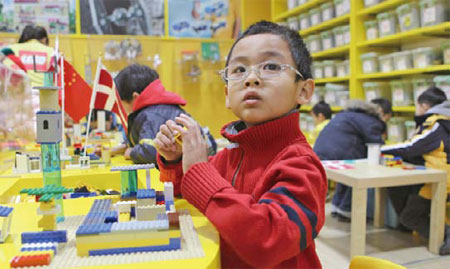News in review Friday, March 15 Thursday, March 21
Updated: 2013-03-22 11:24
(China Daily)
|
||||||||
|
Danish toymaker Lego Group says it will build its first factory in China next year. It will be constructed in Jiaxing near Shanghai, where the company also plans to locate a regional distribution center for Asia. Lego's sales in Asia have grown by more than 50 percent annually in recent years, according to Michael McNulty, Lego's senior vice-president. |


Friday ________________________ March 15
Global auto-plant investments increase
China received almost 60 percent of global automobile-plant investments in 2012 , according to a Canadian research report said.
The world's largest producer and buyer of automobiles received C$9.62 billion ($9.39 billion) last year from new-capacity investments, or 59.6 percent of the global total.
The figure over the past four years was C$40 billion, or 57 percent of the world total, according to the Office of Automotive and Vehicle Research, Odette School of Business, University of Windsor.
The large amount of investment to China is a result of the nation's growing consumer power, said Ma Chunxia, an industrial analyst with Zheshang Securities.
In the first two months of this year, 3.4 million vehicles were sold in China, an increase of 14.72 percent year-on-year, the China Association of Automobile Manufacturers said.
Textile sector needs design innovation
China's textile and garment companies need to put design and brand building ahead of manufacturing, according to some of the country's lawmakers and industrial leaders.
The country faces continued competition from Asian neighbors with lower labor costs, such as India and Cambodia.
China's garment industry saw its slowest growth in a decade in 2012, according to data released by the China National Commerce Information Central.
Garment sales volume at 100 major retailers increased by 2 percent year-on-year in 2012, 2.9 percentage points slower than the previous year.
Monday___________________March 18
Shanghai offers best professional salaries
Shanghai has the highest average salary for professionals among 24 cities surveyed.
That average reached 7,112 yuan ($1,133) a month, according to the 2013 spring job market report released by Zhaopin.com.
Shenzhen ranked second with an average of 6,787 yuan per month. Beijing was third with 5,453 yuan.
The energy/mineral industry in Shanghai pays the highest monthly salaries, averaging 9,711 yuan.
The highest salaries in Shenzhen are in communications and finance with average monthly salaries above 8,200 yuan.
In Beijing, communications tops the list with an average of 7,633 yuan a month, while the property/construction/decoration industry is second with 7,095 yuan and finance is third with 6,950.
Economist is optimistic about rebound
China's economy may make a rebound by the end of the year, according to US economist Stephen Roach.
The former non-executive chairman of Morgan Stanley in Asia also said he expects China to maintain an annual economic growth rate of about 8 percent, half a percentage point above the 2013 target set by former premier Wen Jiabao last week.
"The economy seems to have hit bottom in the third quarter (of 2012), and I expect progressive strengthening over the course of the year - especially if the external climate starts to improve on the heels of a gradual pickup in global growth," Roach told China Daily.
China's economy expanded 7.4 percent between July 1 and Sept 30, the seventh straight quarter in which the pace of growth was slower than the preceding three months, according to the National Bureau of Statistics.
Tuesday__________________March 19
Nebraska opens trade-investment office
China's imports of corn, soybeans and meat from Nebraska and the possibility of greater trade and investment from China led the Cornhusker State to open a trade office in Shanghai.
Governor Dave Heineman on March 18 announced the opening of the Nebraska Center China. "If China and America are strong, the world's going to be. Economically, we need to be connected, and we need to have a strong relationship," he said. "In my state, we would like to do our part."
China is Nebraska's fourth-largest international trading partner. The state's exports to China totaled more than $380 million in 2012, up from nearly $279 million in 2010.
The Shanghai center will provide companies from Nebraska with business counseling, product promotion, assistance in identifying potential business partners and trade show representation. In 2006, The Republican governor opened a similar center in Tokyo.
The trade office will also actively seek more Chinese investment in Nebraska, which is also interested in developing trade in alternative energy and water technology.
Five Chinese companies recently announced plans to establish US headquarters in Nebraska, including Shanghai Liuhe Qinqiang Food Co, which focuses on meat exports to China.

Foam-dinnerware ban to be lifted May 1
Despite concerns of potential environmental risks, a 14-year ban on the sale of disposable dinnerware made of plastic foam will be lifted May 1.
Food packaging made of the substance has been omitted from a list of industries to be eliminated, according to an amended guideline on industrial restructuring from the National Development and Reform Commission in February.
A commission official confirmed to China Daily that the ban will be lifted, but declined to say why. "The commission will explain why the adjustments were made in the near future and release the explanation on its website," he said.
Plastic foam is often called Styrofoam, and is made by the Dow Chemical Co. It's not used to make food containers or disposable coffee cups.
One reason why plastic-foam dinnerware was on a list of products and industries to be eliminated that was approved by the State Council in 1999 was the pollution caused by discarding the material because it breaks down very little in the environment.
About 2 million disposable dinnerware products are used daily in Beijing, and plastic-foam packaging accounts for 20 percent, according to the International Food Packaging Association.
Wednesday_________March 20
Tourism to US expected to rise in 2013
Aggressive marketing and easier visa procedures by the United States will mean the number of Chinese tourists to the country will increase by about 13 percent this year, said travel industry professionals.
"Thanks to the new (US) visa policy, the number of tourists from the Chinese mainland to the US will touch the ceiling of 1.7 million this year," said Xu Chengwu, president of the American Chinese Tourist Association. Established in New York in 2010, the association helps local businesses adapt services for Chinese tourists.
About 1.5 million people from the Chinese mainland visited the US in 2012.
FDI increase ends 8-month decline
The flow of foreign direct investment into China rose in February after dropping for eight consecutive months, according to the Ministry of Commerce.
FDI rose 6.32 percent year-on-year in February to $8.21 billion, the ministry said.
FDI is an important gauge of the external economy to which China's vast factory sector is oriented, though it is a small contributor to China's overall capital inflow compared with exports, which were worth about $2 trillion in 2012.
Spending from the European Union surged 34.01 percent year-on-year to $1.21 billion in January and February while investment from the US went down 5.37 percent year-on-year to $497 million. Investment from Japan dropped 6.7 percent year-on-year to $1.27 billion in the first two months amid maritime tension.
Thursday_______________March 21
China is leader on foreign investments
China is still the world's top destination for foreign investments, with cheap labor, favorable tax policies and an expanding domestic market among the main reasons, according to a research report.
The report jointly released by China Development Research Foundation and PricewaterhouseCoopers (PwC) also listed technology talents and government stimulus measures as among major attractions for foreign investments.
A survey of 227 chief executive officers from multi-national companies showed that 70 percent of those who had businesses in China plan to increase their investments in the next five years, according to the report.
Aging population will squeeze public finances
China's public finances will be under pressure by 2020 because of a disproportionate growth in the number of elderly people, according to a study on global aging trends.
By 2050, China will be caught between a huge jump in the number of older citizens depending on young workers to keep the country functioning and a declining birth rate that will gradually shrink the work force, says the report, by US credit-rating firm Standard & Poor's.
"The pressures will be gradually building up and, especially in 2020, we will see that putting more pressure on the public purse," said report author Marko Mrsnik, S&P's director of sovereign ratings.
The report shows that in 2010, China had a population of 1.34 billion and an old-age dependency ratio - the number of people aged over 65 relative to the population aged 15-64 - of 11 percent. By 2050, the population is projected to fall to 1.29 billion while the dependency ratio soars fourfold to 42 percent, according to the study.

(China Daily 03/22/2013 page8)

 In Photos: 7.0-magnitude quake hits Sichuan
In Photos: 7.0-magnitude quake hits Sichuan
 Li Na on Time cover, makes influential 100 list
Li Na on Time cover, makes influential 100 list
 FBI releases photos of 2 Boston bombings suspects
FBI releases photos of 2 Boston bombings suspects
 World's wackiest hairstyles
World's wackiest hairstyles
 Sandstorms strike Northwest China
Sandstorms strike Northwest China
 Never-seen photos of Madonna on display
Never-seen photos of Madonna on display
 H7N9 outbreak linked to waterfowl migration
H7N9 outbreak linked to waterfowl migration
 Dozens feared dead in Texas plant blast
Dozens feared dead in Texas plant blast
Most Viewed
Editor's Picks

|

|

|

|

|

|
Today's Top News
Live report: 7.0-magnitude quake hits Sichuan, heavy casualties feared
Boston suspect cornered on boat
Cross-talk artist helps to spread the word
'Green' awareness levels drop in Beijing
Palace Museum spruces up
First couple on Time's list of most influential
H7N9 flu transmission studied
Trading channels 'need to broaden'
US Weekly

|

|








